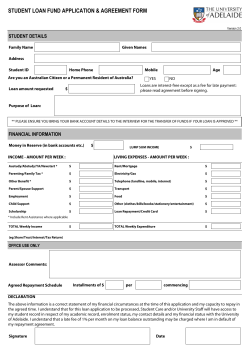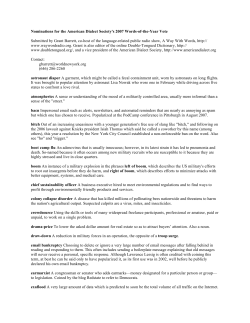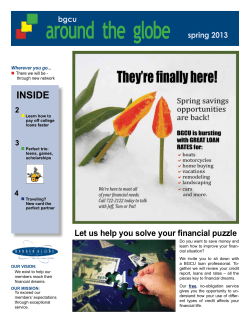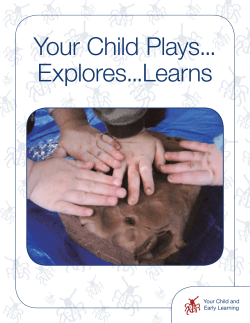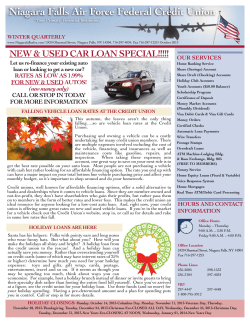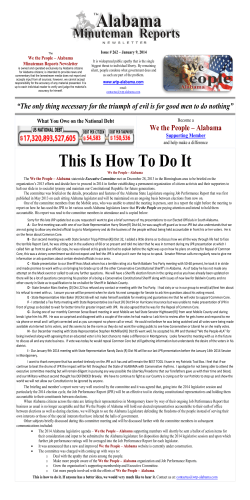
g to ether QUEST
together SP/SU 2014 YOUR FINANCIAL RESOURCE FROM THE NORTH ALABAMA EDUCATORS CREDIT UNION THE MONEY LESSON Resources for Teachers FRAUD PREVENTION in a Digital World New Car QUEST WELCOME to Together! IN THE SPIRIT OF THE North Alabama Educators Credit Union philosophy— “Not for Charity, not for Profit, but for Service”—we are pleased to bring you Together, a publication designed to inform and inspire your financial decisions. Inside, find articles about getting the best deal on auto financing, NAECU’s community outreach efforts, avoiding scams and fraud, personal finance lessons for middleand high school-age kids, and understanding credit scores, among other topics. We hope that you enjoy this premier issue of Together and find that it furthers your financial outlook today and tomorrow, and better connects us to you and the community. Sincerely, Greg Olmsted PRESIDENT/CEO NAECU NOT FOR PROFIT, NOT FOR CHARITY, BUT FOR SERVICE! CONNECT WITH YOUR FRIENDS AT THE NORTH ALABAMA EDUCATORS CREDIT UNION (NAECU). START FOLLOWING US ONLINE TODAY! WE ARE AN EQUAL CREDIT OPPORTUNITY LENDER. QUALIFICATIONS MUST BE MET ON ALL LOANS. RATES AND LOAN AVAILABILITY SUBJECT TO CHANGE WITHOUT NOTICE. YOUR LOAN INTEREST RATE WILL BE DETERMINED BY YOUR CREDIT WORTHINESS AS WELL AS OTHER FACTORS, SUCH AS THE LENGTH OF YOUR LOAN. SAVINGS FEDERALLY INSURED UP TO $250,000 BY NCUA. COMMUNITY OUTREACH You Are So Kind! WE’D LIKE TO THANK YOU—our very generous members—for the help and support you provided for two community causes close to our hearts: Crisis Services of North Alabama and the Huntsville Hospital Foundation. As a result of fundraising in 2013, we were able to present a $2,200 check and other goods to Janet S. Gabel, Executive Director of Crisis Services of North Alabama, and a $2,300 check in honor of breast cancer awareness to Candy C. Burnett, CFRE, President of the Huntsville Hospital Foundation, at our 58th annual membership meeting this past February. Without you, giving back to the community would not be possible. Thank you for your support! FINANCIAL CLASS IS IN SESSION LET’S FACE IT—the learn-as-you-go approach to financial literacy can be very costly; yet many schools are unable to provide students with financial lessons due to limited resources. That’s where the National Endowment for Financial Education (NEFE) comes to the rescue. NEFE—a private, nonprofit, noncommercial organization—provides free personal finance lesson plans, workbooks, and more to teachers, parents, and students in grades 8–12 through the High School Financial Planning Program (HSFPP). Visit HSFPP.org to download digital resources or order print materials focusing on six areas of financial planning, including: →→ Borrowing →→ Earning →→ Financial services →→ Insurance →→ Investing →→ Planning North Alabama Educators Credit Union shares NEFE’s belief in the importance of teaching children and young adults how to manage personal finances. SEND AN EMAIL TO FEEDBACK@NAECU.ORG TO ARRANGE FOR AN NAECU INDUSTRY SPEAKER ON FINANCIAL LITERACY. « NOT FOR PROFIT, NOT FOR CHARITY, BUT FOR SERVICE » NAECU.ORG Keep Your Pay IN YOUR POCKET WHEN YOU NEED CASH QUICKLY FOR AN EMERGENCY, A PAYDAY LOAN MAY SEEM LIKE A GOOD SOLUTION. BUT FOR MANY BORROWERS, THAT SHORT-TERM LOAN CAN TURN INTO LONG-TERM DEBT. THE PROBLEM IS that many borrowers are not able to repay the loan when payday rolls around—which is exactly what payday lenders count on. The vast majority of their profit comes from extending the loan, allowing the borrower to pay the minimum amount and move the loan forward to the next payday. The borrower ends up paying more interest at a very high rate. Payday lenders in Alabama can charge their customers a whopping 456.25% annual percentage rate (APR)! Repeat borrowers can soon find themselves forced to skip paying bills or delay buying necessities just to break the cycle of a payday loan. The National Consumer Law Center reports that personal loans from credit unions are among the most sensible alternatives to payday loans. With reasonable interest rates and realistic repayment plans, a credit union loan can help you solve the cash crisis you’re experiencing today and maybe even help improve your future financial standing. North Alabama Educators Credit Union offers personal loans with affordable fixed interest rates, loan terms up to 60 months, and payments as low as $50 per month. TO LEARN MORE, VISIT NAECU.ORG/RATES.PHP. Skip the Scams IF YOU ARE TEMPTED BY MYSTERY SHOPPER ADS OR EMAILS, READ THIS BEFORE YOU COMMIT. SOME SECRET SHOPPER PROMOTIONS ARE SCAMS THAT CAN LEAVE YOU FOOTING THE BILL. SECRET SHOPPER COMPANIES have flourished during the past 20 years as a way for retailers and service providers to gain a better understanding of their customer experience. Before signing up as a secret shopper, though, be on the lookout for telltale signs of a scam. These include requests for you to pay a registration fee, often to a website, or in another common, more elaborate scam, to “evaluate” a money transfer service. In the money transfer scheme, the scammer sends the mystery shopper a check for a large sum of money. The shopper is instructed to cash the check and use a wire transfer service to send the bulk of the funds back to the company. As payment, the scammer tells the shopper to keep a portion of the money from the cashed check. In NAECU.ORG « NOT FOR PROFIT, NOT FOR CHARITY, BUT FOR SERVICE » reality, the check turns out to be counterfeit, the shopper is out the transferred money, and the scammer is long gone. FINDING THE REAL DEAL If you want to work as a mystery shopper for a legitimate company, know what to expect. Mystery shopper jobs pay on a per-item basis, so think of it as an occasional job. Legitimate secret shopper companies reimburse their mystery shoppers for the purchased goods or services and allow the mystery shopper to keep the products. Some companies also pay a small amount— between $15 and $20 per job. In return, you provide a detailed evaluation form to the company before being paid. 3 WHEELS AND Deals IS IT TIME TO TRADE IN YOUR CLUNKER FOR A NEW RIDE? DO YOUR HOMEWORK BEFORE YOU HEAD TO THE CAR DEALERSHIP—IT COULD SAVE YOU A BUNDLE. Y OU AND YOUR spouse are strolling through the car lot one Saturday morning and come across the slightly used car of your dreams. Its sticker price seems reasonable, and the bright neon letters promise $0 down and low interest. After a test drive, the salesman takes you back to his office to draw up the papers. Moments before you’re about to sign the dotted line, you look at the final purchase price and financing terms and realize they’re worlds apart from what the sticker promised. Sound familiar? Car buyers often experience this disconnect. Fortunately, you can do a few things to prepare yourself for the car-buying experience and avoid costly surprises. KNOW BEFORE YOU GO Before your trip to the dealership, remember these financial tips: →→ C ONTACT A NORTH ALABAMA EDUCATORS CREDIT UNION LOAN OFFICER ABOUT A CAR LOAN. “We have seen good 4 members with great credit scores near 800 who have been charged an auto loan rate that’s four times higher than what they could have received through NAECU,” says Greg Olmsted, President/CEO at the credit union. “If we can’t offer the best rate, we say so and advise members to finance through the dealer.” →→ RESEARCH THE DEALER’S INVOICE PRICE. Knowing how much the car costs the dealer—rather than just the manufacturer’s suggested retail price or list price—is a good starting point if you plan on negotiating the price down. An Internet search can usually provide a reliable estimate of a car’s invoice price. That way, you’ll have a better idea of how low the salesperson can actually go. →→ B EWARE OF HIDDEN FEES. If the final purchase price seems higher than it should be, ask the salesperson to explain each fee in an itemized fashion. Fine-print costs such as document fees are often highly negotiable. When talking cost, always ask if an offered price includes all fees and taxes. « NOT FOR PROFIT, NOT FOR CHARITY, BUT FOR SERVICE » NAECU.ORG Don ’t m iss ecial offer. s sp i h t NAECU is offering a fixed-rate car loan for as low as 2.49% ANNUAL PERCENTAGE RATE New or Used? through May 2014. Both new and used cars carry their own benefits and drawbacks. New cars are often covered by a manufacturer’s warranty, which means you don’t have to worry about paying for any major repairs in the first few years. However, new cars lose approximately 18% of their value in the first year alone. The rate of value loss slows down as a car ages, which makes a used car a more appealing purchase in terms of resale value. It also costs less to insure an older car, although an older vehicle tends to require more maintenance costs and may be less fuel-efficient than a newer model. Certified pre-owned vehicles may be the most cost-conscious option. These used cars are typically only a few years old and have been thoroughly restored and inspected, reducing the risk of hidden repair costs. They also come with warranties similar to a new car but without the sticker shock. Fill ’Er Up When considering which car to buy, don’t forget to factor in ongoing expenses of owning and maintaining the car—including fuel cost. The U.S. Department of Energy offers a helpful breakdown of savings according to a car’s fuel efficiency. As you can see, buying a 35-mpg vehicle versus a 25-mpg vehicle can save you more than $700 annually if you drive 20,000 miles a year: YEARLY FUEL COSTS 15,000 20,000 25,000 25 mpg $1,860 $2,480 $3,100 30 mpg $1,550 $2,067 $2,583 35 mpg $1,329 $1,771 $2,214 MILES DRIVEN → FUEL ECONOMY↓ *BASED ON $3.10/GALLON AVERAGE PRICE OF GAS MOVING PARTS Another ongoing expense to consider? Repairs. High-end luxury vehicles tend to have a larger number of imported parts, which can be costlier to replace. Popular brands may not be as glamorous or unique as a European sports car, but repairs are often significantly less expensive. →→ RESIST OVERPRICED INSURANCE ADD-ONS. If you choose to finance through the dealership, watch for unnecessary or expensive warranties and supplemental auto protection coverage. If you’re in the market for additional coverage options, try your local credit union first. For instance, automotive dealers routinely charge up to $700 for guaranteed auto protection (GAP), a type of supplemental coverage that pays the remainder of the cost not covered by your primary insurance plan for a totaled vehicle. GAP coverage bought through a dealership is also frequently financed into the auto loan, which means you’re paying interest over and above the flat fee. NAECU offers members GAP coverage for a flat $195 fee per covered plan. READY TO BUY A CAR? VISIT YOUR LOCAL NAECU BRANCH. WE CAN TALK THROUGH YOUR FINANCING AND COVERAGE OPTIONS, INCLUDING GAP COVERAGE AND OUR LOW-INTEREST VEHICLE LOANS. LEARN MORE ABOUT OUR LOANS AND DOWNLOAD A PREAPPROVAL APPLICATION FROM NAECU.ORG. NAECU.ORG « NOT FOR PROFIT, NOT FOR CHARITY, BUT FOR SERVICE » 5 FRAUD PREVENTION in a Digital World DO YOU KNOW HOW TO KEEP YOUR CREDIT AND DEBIT CARD INFORMATION SECURE AND WHAT TO DO IF IT’S COMPROMISED? IN FALL 2013, a data breach at Target Corporation jeopardized the information of 40 million consumers. Retailer Neiman Marcus and hotel management company White Lodging also experienced customer data theft last year. Data breaches are infrequent, but incidents across all industries increased 30% from 2012 to 2013, according to the Identity Theft Resource Center (ITRC). Last year, business sector breaches accounted for nearly 34% of the all-industries total of 619 incidences, with hackers committing the most offenses, ITRC data shows. Cybercriminals may use the information to make fraudulent charges and commit other crimes. STAND UP FOR SHOPPING SECURITY These tips can reduce the risk of your information being caught in a compromising situation and limit headaches if it is: →→ S IGN UP FOR MOBILE BANKING, which will allow you to check your accounts often for suspicious activity. →→ FORM A FINANCIAL BACKUP PLAN to ensure your family is able to pay for essential goods and services if your data is compromised and your credit and debit cards are temporarily unavailable. →→ ONLY MAKE ONLINE PURCHASES from a secure Internet connection. Cybershop with Visa gift cards to keep your data off the Web. →→ PAY RECURRING BILLS via automated clearing house rather than your debit card to avoid the hassle of setting up payments with a new card if the old one is compromised. →→ USE YOUR CREDIT CARD for purchases as much as possible. Avoid entering your personal identification number when using your debit card. Immediately report any dubious transactions or suspicions of compromised data to North Alabama Educators Credit Union. The sooner we know about potential fraud, the quicker we can act to protect your assets. When it comes to managing data breaches, your credit union has your back. Monitor your accounts using NAECU’s free CU-Online Homebanking, Mobile Money, and MemberLink Audio Response services. STOP BY A BRANCH TO LEARN MORE OR VISIT NAECU.ORG. 6 Priceless Peace of Mind Never worry about being held responsible for fraudulent charges to your NAECU accounts— WE DO NOT charge our members a fraud liability fee. The Burden of Breaches By mid-February 2014, U.S. credit unions spent more than $30 million managing the effects of last fall’s Target Corporation data breach—without factoring in fraud charges, according to the Credit Union National Association (CUNA). Reissuing 4.6 million credit and debit cards to affected members cost credit unions an average of $5.68 per card. Alabama credit unions reported more than $400,000 in costs to CUNA by late January. Consumer protections can mitigate the financial consequences of breaches for shoppers, but credit unions must expend time and money identifying and replacing affected cards, as well as absorbing and repaying members’ losses. Credit unions are not-forprofit entities that pass along earnings to members, so when a credit union takes a financial hit from a breach, the people it serves may feel the effects, too. « NOT FOR PROFIT, NOT FOR CHARITY, BUT FOR SERVICE » NAECU.ORG Decoding Your CREDIT SCORE Psssst! Know what?A GOOD CREDIT SCORE CAN HELP YOU HOOK UP CABLE TO YOUR TV, BUY A HOME, AND EVEN GET A JOB. DISCOVER HOW TO KEEP IT IN TIP-TOP SHAPE. YOUR CREDIT SCORE is a number ranging from 300 to 850 that reflects the payment history shown in your credit report, the length of time you’ve had credit, and your ratio of debt to available credit. When you apply for a loan, sign up for insurance or new utility services, or rent an apartment, prospective lenders and landlords purchase your credit report and use the information in it to help make lending decisions, such as whether or not to approve your loan and at what interest rate. WHO’S KEEPING SCORE? The debt you owe on credit cards and in mortgage, car, and student loans, the number of credit cards in your name, and whether or not you pay your bills on time are all reflected in your credit score. Matters of public record, such as bankruptcies, lawsuits, and arrests, are also considered. The North Alabama Educators Credit Union recommends contacting the three major credit-reporting agencies—Equifax, Experian, and TransUnion—on a rotating basis every four months to maximize your free credit report reviews (see “It’s Free—That’s the Law!”) and keep an eye out for credit report errors or fraudulent activity. Each time that you review your credit report, highlight any questionable information and compare those items with your own records. If you find an error, report it in writing to the creditor and reporting agency that issued the report and be sure to include any supporting documents, such as canceled checks or bank statements. IT’S FREE—THAT’S THE LAW! THE FEDERAL FACT ACT OF 2003 ENTITLES YOU TO A FREE COPY OF YOUR REPORT ANNUALLY. TO REQUEST A FREE COPY OF YOUR CREDIT REPORTS FROM EACH OF THE THREE MAJOR CREDIT-REPORTING COMPANIES, VISIT ANNUALCREDITREPORT. COM OR CALL 877.322.8228. NAECU.ORG « NOT FOR PROFIT, NOT FOR CHARITY, BUT FOR SERVICE » The Sky’s the Limit A GOOD CREDIT HISTORY BUILDS THE FOUNDATION FOR A HIGHER CREDIT SCORE. THESE TIPS CAN SET YOU ON A PATH TOWARD BETTER CREDIT. Pay more than the minimum. 1 Maxed out credit cards can negatively affect your credit score, even if you pay your bills on time. By making monthly payments higher than the minimum payment, you can pay off debts quicker, save money on interest, and decrease your debt-to-income ratio. Make payments on time. 2 Even one late or missed payment can mean higher interest rates, late fees, and a negative impact on your credit score. If you’re having trouble keeping track of bill payments, set up automatic payments through your free North Alabama Educators Credit Union Bill Payment Service. Be patient. 3 If you’ve filed for bankruptcy or have other items reflecting negatively on your credit score, don’t get discouraged. Focus on rebuilding your credit, and remember, most negative items are eventually dropped from credit reports. 7 INDICIA AND EXACT ADDRESS TO FOLLOW 2309 WHITESBURG DRIVE, S P.O. BOX 128 HUNTSVILLE, AL 35804 — O G E H T N O BANKING Free! d n a t Fas Connect with your Credit Union! FOLLOW US TODAY! NORTH ALABAMA EDUCATORS CREDIT UNION CU-ONLINE MEMBERS CAN HANDLE THEIR FINANCES ANYWHERE, ANYTIME, WITH THE SECURE CU-ONLINE HOME BANKING MOBILE APP. Install our CU-Online Home Banking Mobile app, and you can check your balances, transfer funds, make loan payments, and review transactions 24/7 on your phone. Here’s how: 1 2 3 In your phone app store, search for “touchbanking.” Then choose and install the Fiserv Solutions, Inc. touchbanking app. Use GoMobile0361 as your app code, and login with your CU-Online Home Banking username. Verify your account by answering one of your Home Banking challenge questions. You’re in! Through the CU Home Banking Mobile app, you can see the same accounts as you do with CU-Online Home Banking. It’s account access anytime you need it. The free mobile banking app is available for iPhones and Android phones. PLEASE NOTE: YOU MUST BE A CURRENT NAECU CU-ONLINE HOME BANKING USER. NOT AN NAECU CU-ONLINE HOME BANKING USER? VISIT NAECU.ORG TO ENROLL. together SP/SU 2014 YOUR FINANCIAL RESOURCE FROM THE NORTH ALABAMA EDUCATORS CREDIT UNION THE MONEY LESSON Resources for Teachers FRAUD PREVENTION in a Digital World New Car QUEST together SP/SU 2014 YOUR FINANCIAL RESOURCE FROM THE NORTH ALABAMA EDUCATORS CREDIT UNION THE MONEY LESSON Resources for Teachers FRAUD PREVENTION in a Digital World New Car QUEST together SP/SU 2014 YOUR FINANCIAL RESOURCE FROM THE NORTH ALABAMA EDUCATORS CREDIT UNION THE MONEY LESSON Resources for Teachers FRAUD PREVENTION in a Digital World New Car QUEST
© Copyright 2025



